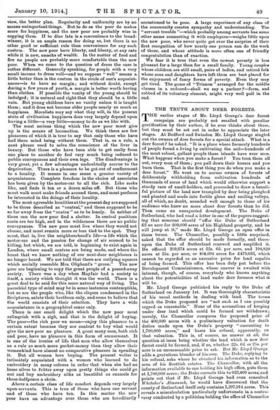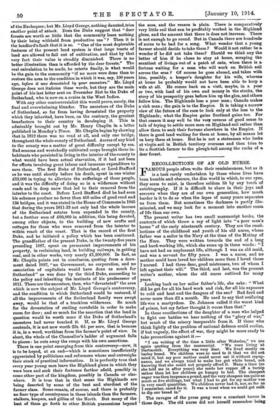THE TRUTH ABOUT DEER FORESTS. THE earlier stages of Mr.
Lloyd George's deer forest 1 campaign are probably not recalled with peculiar gratification by their author, if he ever thinks about them, but they must be set out in order to appreciate the later stages. At Bedford and Swindon Mr. Lloyd George singled out the owners of deer forests for a special attack. What is a deer forest P he asked. "It is a place where formerly hundreds of people found a living by cultivating the soil—hundreds of the most robust, gallant people these islands have ever seen. What happens when you make a forest P You turn them all out, every man of them; you pull down their houses and you burn them. That ie the first thing you do when you make a deer forest." He went on to accuse owners of forests of deliberately withholding from cultivation hundreds of thousands of acres of land which would otherwise support a sturdy race of small-holders, and proceeded to draw a beauti- ful picture of the land now trampled by deer being ploughed and planted and made into fertile glens and smiling valleys, all of which, no doubt, sounded well enough to those of his audience who knew no more about deer forests than he did. Then came an unexpected development. The Duke of Sutherland, who had read a letter in one of the papers suggest- ing that someone should "offer the Duke of Sutherland £2 an acre for 200,000 acres of his Highland property, and he will jump at it," made Mr. Lloyd George an open offer in those terms. The Chancellor, possibly a little surprised, asked that the offer should be made formally, and there- upon the Duke of Sutherland renewed and amplified it. He offered 209,874 acres at 22s. 6d. per acre, and 194,820 acres at 25s. per acre, or 404,694 acres for £479,633, which cannot be regarded as an excessive price for land capable of being farmed. This offer has been duly put before the Development Commissioners, whose answer is awaited with interest, though, of course, everybody who knows anything about the potentialities of land under deer foresees what it will be.
Mr. Lloyd George published his reply to the Duke of Sutherland on January let. It wan thoroughly characteristic of his usual methods in dealing with land. The terms which the Duke proposed are "not Buell a8 I can possibly regard as reasonable." None of the accusations of keeping under deer land which could be farmed are withdrawn; merely, the Chancellor compares the proposed price of the 400,000 acres with a preliminary valuation for death duties made upon the Duke's property "amounting to 1,700,000 acres," and bases his refusal, apparently, on that valuation. This is, of course, no answer at all, the question at issue being whether• the land which is now deer forest could be farmed, and, if so, whether 22s. 62. or• 25a. per acre is an unreasonable price to ask. But Mr. Lloyd George adds a gratuitous blunder of his own. The Duke, replying to his refusal, asks where he obtained his information as to the area of his Scottish estates. The Chancellor, with all the information available to one holding his high office, pate them at 1,700,000 acres ; the Duke corrects this to 923,400 acres; and points out that if Mr. Lloyd George had even consulted Whitaker's Almaneek, he would have discovered that the county of Sutherland itself only contains 1,297,914 acres. This reveals a miscalculation particularly unfortunate in a centre. versy conducted by a politician holding the office of Chancellor
of the Exchequer; but Mr. Lloyd George, nothing dannted,tries another point of attack. Does the Duke suggest that " deer forests are worth so little that the community loses nothing by their being withheld from productive use " ? Then it is the landlord's fault that it is so. " One of the most deplorable features of the present land system is that large tracts of land are allowed to fall out of cultivation, and that by that very fact their value is steadily diminished. There is no better illustration than is afforded by the deer forests." The real calculation to be made, he retorts finally, is *bat would be the gain to the community "if no more were done than to restore the area to the condition in which it was, say, 100 years ago, before it was devastated by your ancestors." Mr. Lloyd George does not italicise these words, but they are the main point of his last letter sent on December 31st to the Duke of Sutherland, who is now on a cruise in the West Indies.
With any other controversialist this would prove, surely, the final and overwhelming blunder. The ancestors of the Duke of Sutherland, so far from having devastated the property which they inherited, have been, on the contrary, the greatest benefactors to their country in developing it. This is admirably brought out by Mr. Henry Chaplin in a letter published in Monday's Times. Mr. Chaplin begins by Showing that in 1812 there was no road at all, and only one bridge, throughout the whole county of Sutherland. Access of any kind to the county was a matter of great difficulty except by sea. Bad seasons and wretchedly cultivated crops brought those in- habitants who persisted in living in the interior of the county to what would have been actual starvation, if it bad not been for efforts involving great labour and immense expenditure to save them. The first Dnke of Sutherland, or Lord Stafford as he was until shortly before his death, spent in one winter £12,000 in trying to alleviate the sufferings of these people, and it was the difficulty of doing so in a wilderness without roads and in deep snow that led to their removal from the interior to the coast. Before Lord Stafford died he had seen his schemes produce no fewer than 450 miles of good road and 134 bridges, and it was stated in the House of Commons in 1845 that during the years 1811.33 not only had the whole income of the Sutherland estates been expended in the county, but a further sum of £60,000 in addition, this being devoted, among other objects, to the building of new crofts and cottages for those who were removed from the interior to within reach of the coast. That is the record of the first Duke, and he initiated a policy which has been continued. The grandfather of the present Duke, in the twenty-five years preceding 1887, spent on permanent improvements of his property, in reclaiming land, in building railways, in getting coal, and in other works, very nearly £1,200,000. In fact, as Mr. Chaplin points out in conclusion, quoting from a don- meat dated 1887, "no Government, no corporation, and no association of capitalists would have done as much for Sutherland" as was done by the third Duke, succeeding to the policy and inheriting the instincts of his predecessor of 1811. These are the ancestors, then, who "devastated" the area which is now the subject of Mr. Lloyd George's controversy, and the condition to which Sutherland would be restored, if all the improvements of the Sutherland family were swept away, would be that of a trackless wilderness. So much for the devastation of smiling cornfields in order to make room for deer; and so much for the assertion that the land in question would be worth more if the Duke of Sutherland'e ancestors had never touched it. If, as Mr. Lloyd George contends, it is not now worth 22s. 6d. per acre, that is because it is, in a word, worthless from the farmer's point of view. In short, the whole of the Chancellor's ladder of argument falls to pieces: he cuts away the rungs with his own assertions. There is one point emerging from this controversy—now, it is to be hoped, at an end—which is sometimes insufficiently appreciated by politicians and reformers whose seal outweighs their stock of practical information. It is perfectly true that every year young men leave the Highland glens in which they were born and seek their fortunes farther afield, possibly in some other part of the kingdom, possibly in Canada or else- where. It is true that in that sense the Highlands are being deserted by some of the best and sturdiest of the farmer class. Some remain, of coarse, and there is probably no finer type of countryman in these islands than the farmers, stalkers, keepers, and gullies of the North. But many of the beet of them go forth to other British possessions beyond the seas, and the reason is plain. There is comparatirely very little soil that can be profitably worked in the Highland glens, and the amount that there is does not increase. There is not enough to go round. But in Canada there are hundreds of acres to be had for a song. What wonder that a young farmer should decide to take them ? Would it not rather be a wonder if he did not take them? Should we think any the better of him if be chose to stay at home, scraping the scantiest of livings out of a patch of oats, when there is a fortune waiting for a man who will work on British soil across the eeaa ? Of course he goes abroad, and takes with him, possibly, a keeper's daughter for his wife, whereas at home he probably would not have been able to keep a wife at all. He comes back on a visit, maybe, in a year or two, with land of his own and money in the stocks, the story of hie prosperity goes before him up the glen, and others follow him. The Highlands lose a poor man ; Canada makes a rich man ; the gain is to the Empire. It is taking a narrow view of the future of the race to look only at the loss to the Highlands; what the Empire gains Scotland gains too. For that reason it may well be the very reverse of good sense to talk of trying to settle more men on Highland soil rather than allow them to eeek their fortune elsewhere in the Empire. If there is good land waiting for them at home, by all means let us keep them at home. But he is not a statesman who looks at virgin soil in British territory overseas and then tries to tie a Scottish farmer to the plough-tail among the rocks of a deer forest.







































 Previous page
Previous page